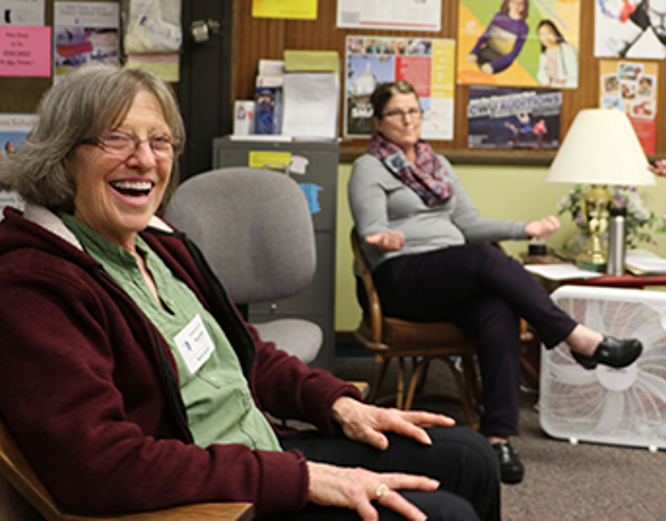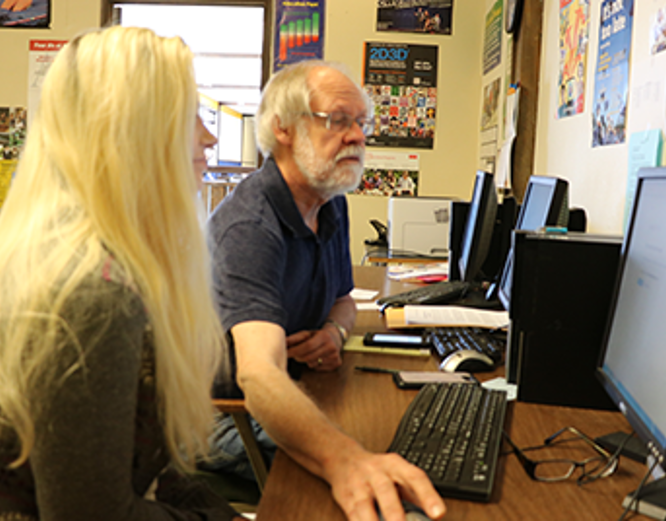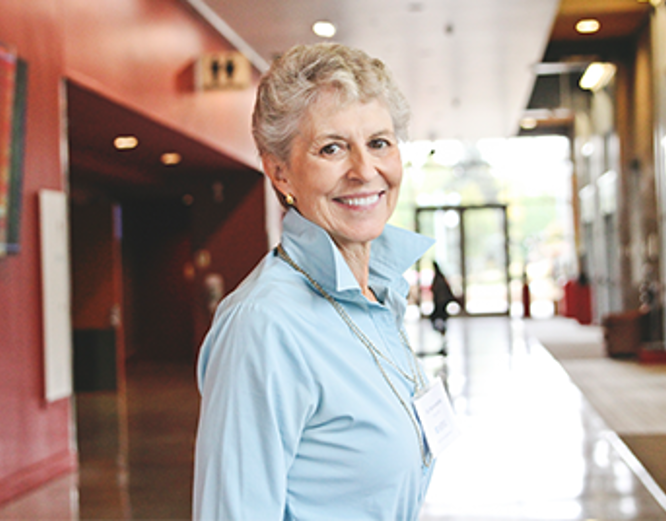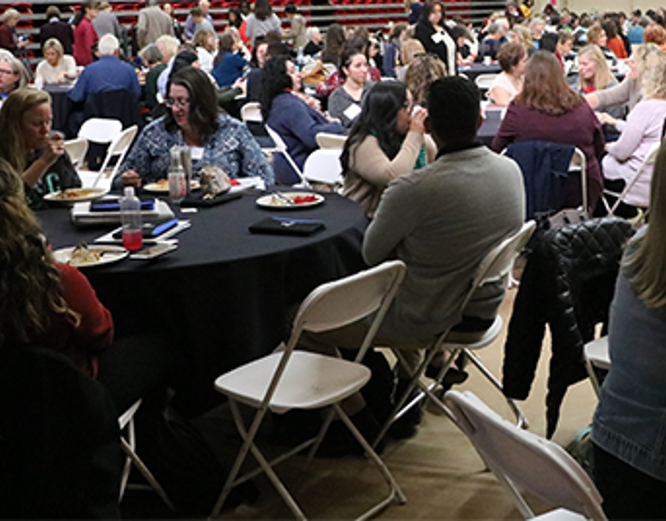Building Your Mentor Program

Mentors help expand an ASPIRE site’s impact, connecting and giving personalized support to a greater number of students.
Community and staff mentors in your ASPIRE program work with middle school, high school, and/or adult learners to guide and assist them as they determine their future plans. Mentors will connect with students one-on-one, in small groups, during career and college educational events, and activities. A mentor’s work is rewarding as they assist and help students focus on career exploration, career and college research, admissions applications, scholarships, and financial aid.
“The time people give to volunteer to help mentor kids, who may not have the support at home they need to get through the process is invaluable!” – An ASPIRE Mentor

Mentor Recruitment Resources
Recruiting mentors to serve with your ASPIRE programs takes careful thought and planning. The resources in this section will help you determine how mentors can be utilized in your ASPIRE program and offer some suggestions for where to find mentors. Resources and tips to help you develop a recruitment plan are also provided in this section.
Use these resources to help you grow and manage your ASPIRE Mentor program.
- Top 10 Mentor Management Tips
- Mentor Recruitment Tips
- Why Mentor with ASPIRE?
- Mentor Recruitment Messaging Guide and Marketing
Mentor Recruitment Social Media Posts
- Social Media Posts in English
- Social Media Posts in Spanish
First step for recruiting is to identify the way you intend to use ASPIRE mentor's at your site.
- One-on-one where mentors meet with students
- Group Mentor opportunities (grade level, interest groups, etc.)
- Classroom engagement
- Lunch/Afterschool Availability
- Student “Drop-in” Sessions
- CCR Programming
- Family engagement events
One you have identified the ways you will use mentors, you are ready to create a Mentor Recruitment Plan.
You are encouraged to identify 3-6 ways where you will actively work to recruit mentors to your team. Remember, the more individuals you have assisting you and mentoring students, the more students you will help achieve and reach their goals. Download Mentor Recruitment for more ideas.
- A personal invitation is the BEST way to recruit
- Current mentors are your #1 resource for future mentor recruits. Train your mentors to share their mentor experience with those they know and invite others to join the team
- Enlist your staff (administrators, teachers, counselors, support staff, etc. to share the ASPIRE program and mentor opportunity)
- Always have your ASPIRE elevator speech (1 minute explanation of program/opportunity to serve students & make a difference) ready. Engage with those you meet in the community
- Communication/Social Media: Get the word out
- School/Site newsletters
- FB, Instagram, Twitter, and other social media platforms
- Local Newspaper article
- Local advertisement/marketing
- Email/postcard to parents, school/site staff, etc.
- Other Opportunities for Recruiting Mentors
- ASPIRE tables at Parent conference and Summer Taking care of Business/Registration days
- Parent Groups (PTA, school boosters, sport clubs, Latino parent club, other groups)
- Ask to present and/or attend Civic Organization meetings (Rotary, Chamber of Commerce, Elks, Lions, American Legion, etc.)
- Community bulletin boards (physical and digital)
- Display feature at local public library
- Identify local employers who provide paid service hours to their employees and offer ASPIRE mentor brochures to promote interest
- Connect with local 2 or 4-year colleges in your area. Talk with student services offices, education/social work departments, etc.
- Religious Organizations (Churches, Young Life leaders, etc.)
- Military Recruiters (ask them to take their “recruiter hat off” when in a mentor capacity and focus on interests/goals/needs of student)
If you have questions or need help with your Mentor Recruitment Plan, please reach out to your ASPIRE access specialist for assistance.

Starting New Mentors
With new mentors successfully interested in serving with your program it is time to start helping mentors complete their application, background check, interview and other onboarding documentation. Also, it is critical to provide training to your new mentors before they start working with students. The resources in this section will help you through this process.
Traditional Mentor: Community adult volunteers who work with students 1-on-1 or in groups to help with career and college planning
Staff Mentors: ASPIRE Site staff who assist and have ongoing communication with students about their future. These may include counselors, Career and College Readiness teachers (CCR or AVID Classes), coaches, support staff, etc.
Peer Mentors: An ASPIRE high school junior or senior who has participated in ASPIRE. Peer mentors can be matched 1:1 or in groups for grades 6-12 on topics related to high school success, career and college exploration, or may participate in peer panels in classrooms or at events.
Episodic Mentors: Community adult volunteers who occasionally assist with career and college readiness at your ASPIRE site but do not serve on a consistent basis. These mentors may provide educational career or college presentations, participate in industry/business/college panels, and more.
Project/Event Support/Administration Mentors: Community adult volunteers who assist the ASPIRE Coordinator with projects which may include working through student lists for a particular purpose (example: meeting with senior students who have not completed the FAFSA or ORSAA, Oregon Promise, OSAC Scholarship). These mentors may also be individuals who work on creating a welcoming ASPIRE Center Environment (build displays, organize center resources, etc.) or specifically assist during events or CCR activities (college fairs, family engagement events, Senior Celebration/Decision Day, field trips, etc.)
Team Lead Mentor: Experienced ASPIRE Coordinator that assists the ASPIRE coordinator in recruiting new mentors, matching mentors and students, coordination of mentor/student meetings, and providing resources and information to mentors. Team leads may also help ASPIRE coordinator with other administrative roles.
Once a community member or staff have expressed interest in becoming a mentor, they will need to complete the following steps:
STEP ONE: Community Mentor Application
Send the ASPIRE Volunteer Application to the interested mentor. Request they complete and return the application to the ASPIRE Coordinator, along with any other site-specific materials required.
- If your school/organization uses another volunteer application, you may use your own site application rather than the ASPIRE application.
- Staff Mentors are not required to complete an ASPIRE Application due to their status as paid staff at the ASPIRE school/site
STEP TWO
All volunteer mentors must complete the Mentor Agreement that gives an overview of the volunteer ASPIRE mentor position. Mentor roles, responsibilities, and expectations are identified in these documents. Mentors must sign and agree to the conditions prior to meeting with students.
STEP THREE: Background Check
Before a mentor can begin working with students ASPIRE Coordinator must ensure the mentor completes their background check, since they will be working with youth. Sites may choose to use their own process for background checks or use the Oregon Department of Education (ODE) background check process. ODE has a $5 fee per applicant. ASPIRE grant funds can be used to cover the cost.
STEP FOUR: Meet with Potential Mentor
ASPIRE Coordinator requests a time to discuss the mentor position and get to know your new mentor. Ideally, this is done in person, but may also be completed by phone or video conferencing (Zoom, Teams, Google Meets). The ASPIRE Coordinator may want to use the Mentor Information Form as an interview guide, or alternatively, have the individual complete this form and bring it to the meeting to use in the discussion. During this conversation coordinator might also ask for schedule availability and share information about the ASPIRE program.
STEP FIVE: Required Training and Providing Mentor Resources
Training requirements and information are found in the next section.
Once a mentor has completed and passed the background check, mentors need to complete their ASPIRE site orientation and training before working with students.
RESOURCES
ASPIRE SITE TRAINING
Coordinators should schedule a time to meet with the approved mentor. During this ASPIRE Site Training meeting coordinators will:
- Review site policies/procedures and Mentor Responsibilities and Resource Guide
- Introduce to the ASPIRE Mentor Toolkit, Volunteer calendar and other important ASPIRE or internal resources/materials you use
- Include a tour of your ASPIRE Center
- Introduce your new mentor to school/site staff
- Set-up Mentor Schedule. Depending on the mentor’s availability, determine the days/times mentors will work at the ASPIRE site
- Determine what Mentor Roles the new volunteer will hold
- Give mentor the opportunity to shadow a current mentor (if possible)
- Leave time for questions
Mentor Training Basics (REQUIRED): Coordinators can choose to have mentors complete this task during or prior to orientation. This is a great overview and essential information is offered to help mentors support students in their career/college plans. The training is offered in two formats:
- Mentor Training Basics is offered virtually in a Zoom format, so mentors can interact with ASPIRE staff and able to ask questions.
- Mentor Training Basics Video. Mentors can view this video at their convenience if they are unable to attend the virtual zoom training.
ADDITIONAL ASPIRE TRAINING OPPORTUNITIES
Some mentors look for additional ways they can educate themselves about the career/college planning process. The Events and Training offers more training opportunities:
- Mentor Connections: Monthly topical trainings related to career/college planning. These events always end with Q & A where mentors can bring questions (related or unrelated to the topic being presented)
- ASPIRE Fall Conference: ASPIRE’s annual event brings together ASPIRE site staff, ASPIRE volunteers, and career and college readiness professionals from across the state. The event is designed for attendees to collaborate, share resources, and learn the latest in college and career readiness.
- ASPIRE/OSAC Webinars: Topical and seasonal offerings that provide information on career and college planning, financial aid, scholarships, loans, Oregon Savings Plan, and more

Matching Mentors with Students
Mentoring is a relationship based experience, and it is important that both the mentor and student feel comfortable and excited with the match. The resources in this section will help you identify the skills, abilities, and needs of both your mentors and students.
Strategically Match Students to Volunteers
When possible it is preferable if your site matches students to specific volunteer mentors (as opposed to a more fluid drop-in approach). Creating a connection promotes buy in and consistency tends to increase with both mentor and student participation. There are a variety of ways you can consider matching mentors with students:
- Student’s interest in the mentor's career field
- Shared hobbies or interests
- Other common backgrounds (First generation college student experience, connecting mentors of like ethnic/racial background with students, etc.) Wording?
The forms below allow mentors and students to share a bit about themselves to you, which then you can use to match students to mentors.

Mentor Recognition and Retention
They say a happy and successful mentor is the best way to recruit additional people to serve with your program. This section includes a variety of resources to help you thank your mentors and keep them coming back year after year.
Mentor recognition is an extremely important part of mentor management. The more a mentor feels valued and appreciated the more likely they will be to mentor with excellence and continue to work in your ASPIRE program. Below are some practical ways that you can recognize your ASPIRE mentors:
Resources
Nonverbal Communication to Show Appreciation
- Physically get up and greet mentors when they arrive.
- Smile and give positive nods to encourage mentors as they meet with students.
Communicate Appreciation
- Every time you see a mentor, you should communicate appreciation and gratefulness.
- Verbal appreciation and gratitude (thank you, I’m glad you are here, etc.)
- Written notes of appreciation: 1-3 times a year send them a personalized thank you note
- Look and find ways to complement mentors and the way they are supporting students
Student Appreciation
- Encourage students to show their appreciation to their mentors at least once a year
- Thank you notes
- Mentor appreciation party/event that students assist/serve mentors
Create an Inviting Space
- Create a comfortable workspace for mentors and students to meet
- Provide needed resources, supplies, and materials that will assist mentors in serving students
- Create a center that visually embraces both career and college research, exploration, and support
Appreciation Thank you note/gift
- Doesn’t have to be big just something to say “thank you” for ongoing work with students
- Thank you note from ASPIRE Students or from you
- Site/School Swag (gifts with MS/HS/CBO branding) – stickers, hats, t-shirts, travel mugs, etc.
- Gift Cards (local coffee shop, etc.)
- Items made by students at your school – CTE Classes (culinary, construction, graphic design, business, etc.)
- Flowers, balloons, cards, etc.
To build a strong ASPIRE mentor program, retention of your mentors is essential. Below are some proven ways that ASPIRE coordinators can work to retain their most valuable assets, their mentors.
Provide Strong and Clear Communication
- Mentors appreciate knowing what to expect when they start volunteering.
- Interview and get to know mentors using the Mentor Information Form. Make a note of strengths and areas of interest. Try and use mentors in roles that highlight their personal interests and strengths.
- Try and reduce “surprises.” Make sure to give mentors a tour of your building and the areas where they will be mentoring students (be sure to include bathrooms they can use, lockdown and alarm procedures, etc.)
Empower Mentors
- Mentors don’t have to “know it all.” Encourage mentors to use career and college toolkits, ASPIRE and mentor resources, ECMC Opportunities Books, and partner/college websites to find answers to questions.
- Make sure all mentors watch the ASPIRE Mentor Basic Training and are provided the Career and College Basics documents. In addition, encourage them to attend ongoing training like the Fall Conference and ongoing OSAC/ASPIRE webinars.
- Ask questions.
Give Feedback and Support
- Make sure you regularly check-in with your mentors.
- Develop a team environment: when you can, allow mentors to give feedback and share ideas.
- Listen to mentors’ ideas and build an environment that supports this open communication.
- As you implement ideas/suggestions from your mentors identify and praise their contributions. You never know what great ideas mentors may give you to improve your ASPIRE program.
Build Community
- Building a strong morale among your mentor team is important. A mentor team can be their own support where they feel comfortable asking other mentors questions to gain insight/knowledge.
- Provide opportunities for mentors to get to know one another. Make sure you introduce new mentors, and consider 1-2 times a year a “mentor training/gathering” to build community.
- ASPIRE Ambassadors: Identify your mentors as “ambassadors” and encourage them to share ASPIRE with their friends, business colleagues, and civic organizations where they are members to encourage others to join the team.
Share the Success Stories
- When you hear stories of success make sure you tell your mentors. Celebrating together provides encouragement and helps us remember the WHY.
- Don’t be afraid to ask your mentors for additional help as it makes them feel valued
- Identify ways mentors can utilize personal strengths to assist students and/or serve ASPIRE in ways they feel they are successful.
- Look for administrative strengths in your mentors and consider them for an ASPIRE Volunteer Team Lead Role or assisting with specific projects
- Written communication strengths may lead you to ask mentor to review student essays, help with an ASPIRE newsletter, social media posts etc.
- Creative/artsy mentors could help create a CCR display in ASPIRE center/hallways, design posters for events, etc.
ASPIRE Menu
About ASPIRE and ASPIRE Resources
Career Toolkit
College Toolkit
High School Program Toolbox
Middle School Program Toolbox

© 2026 Higher Education Coordinating Commission